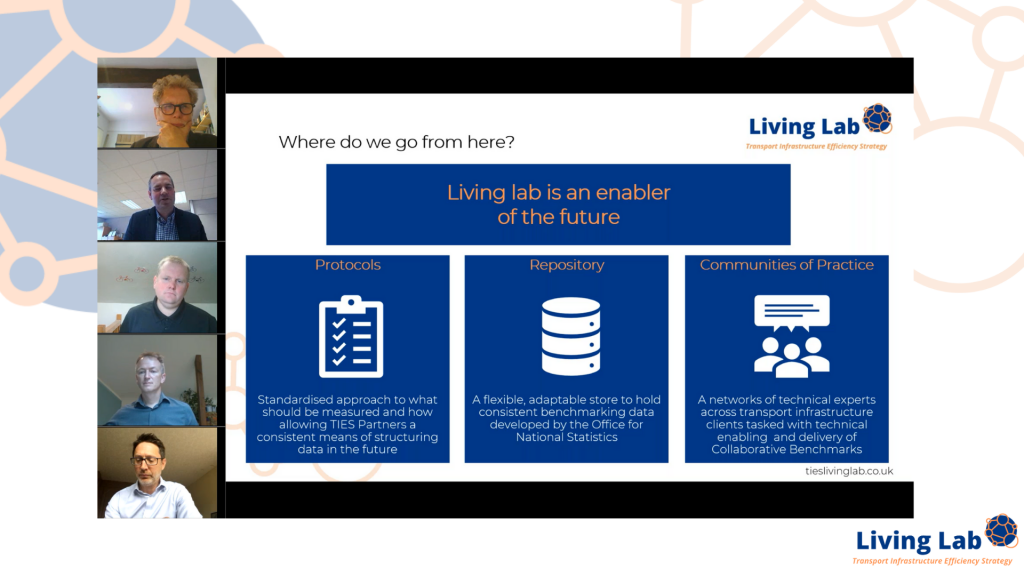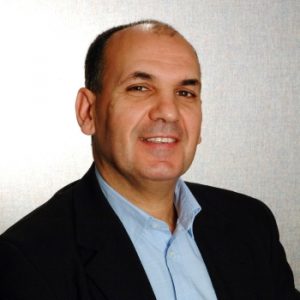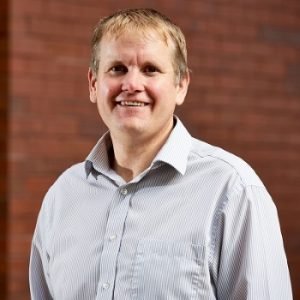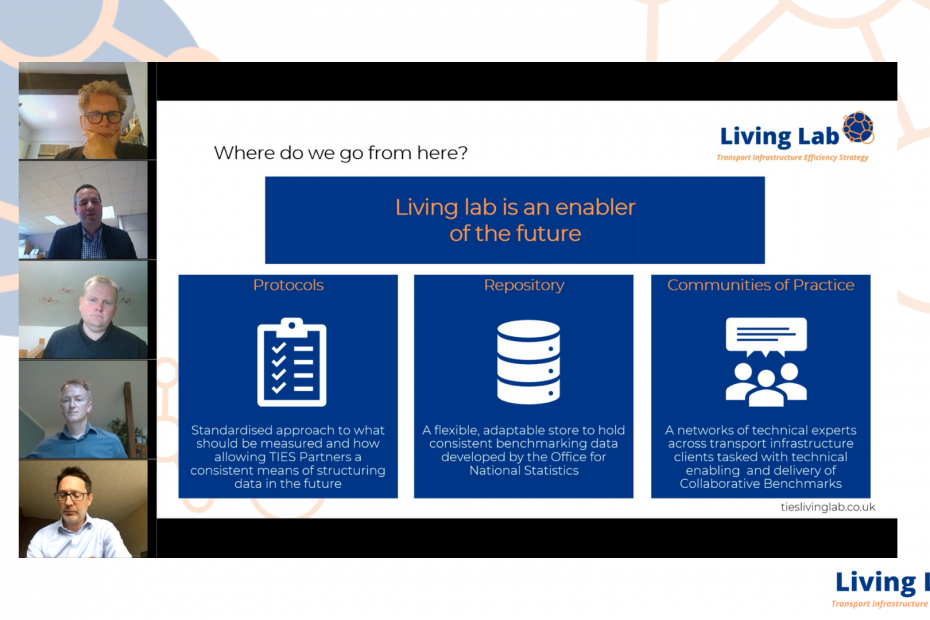Event Date:
20/05/2022
Event Time:
10:30
Location:
Online

Event Details:
This event took place on Friday 20th May 2022. If you would like to watch the recording, you can do so here.
Overview
The government wants to deliver an infrastructure revolution. That means a radical improvement in the quality and delivery of the UK’s transport infrastructure to help level up the country and create the path to net zero emissions by 2050.
Join our ‘Harnessing Data to Drive Cultural Change in Transport Infrastructure’ seminar, part of the TIES Living Lab Advanced Learning Series, taking place online on Friday 20th May 2022. The session will begin at 10:30am and end at 12:00pm and is hosted by Neil Robertson, CEO of the National Skills Academy for Rail (NSAR).
Doug Forbes, Director of Whole Life Consultants, Lamine Mahdjoubi, Professor at the University of the West of England, Phill Wheat, Professor at the University of Leeds and Chris Fry, Managing Director of Accelar, will be discussing the smarter use of data and benchmarking across the life cycle of construction projects. Addressing productivity, decarbonisation, environmental and social value improvements alongside the traditional aspects (e.g. cost, quality and schedule), the panel will consider a wide range of opportunities to enhance the value of public investment in transport infrastructure. Independent client-side speaker, Marc Rosza, Smart Motorways PMO Director at National Highways, will ask questions about Communities of Practice, real-world application and the legacy of the project.
This event is an opportunity for client and supply chain teams involved in the construction of transport infrastructure to hear the latest on the use of benchmarking to improve project performance.
The Panel

Doug Forbes
Doug Forbes is a Director of Whole Life Consultants Ltd and an Honorary Research Fellow at the University of Dundee. He has carried out research specifically for construction for more than 15 years. He is a Chartered Civil Engineer and started his career working on-site for Scottish Water projects. His research over the last decade and a half has consistently taken a holistic approach – covering the economic, social and environmental considerations – with a significant focus on the whole life cycle of a project. His PhD examined the risks associated with the sustainability assessment of housing.
He has specialist expertise in labour forecasting which has resulted in the development of CITB’s Labour Forecasting Tool. The tool has been widely used to help with construction skills planning on major projects and programmes including HS2. He currently leads on metrics, benchmarking and the repository for the TIES Living Lab project. This work seeks to develop standardised approaches to data capture and recording to help improve performance across transport infrastructure.

Lamine Mahdjoubi
Lamine Mahdjoubi is co/Director of the Centre for Architecture and Built Environment Research, and Professor of Digital Built Environment in the Faculty of Environment and Technology at the University of West England, Bristol. He leads two projects for TIES Living Lab; Artificial intelligence for Data Mining and the Demonstrator Modern Methods of Construction Offsite Advanced Logistics. He has led and managed research projects for the Engineering and Physical Sciences Research Council (EPSRC), the British Academy, the EU, a number of charities, local authorities and members of the industry as well as the QNRF Qatar Foundation. He is the founder of the Virtual Reality Enterprise Centre, which was the first centre of its kind in promoting knowledge exchange in the visualisation and analysis of the built environment.
His key research interests involve the development of innovative methodologies and tools for examining the interaction of people and their built environment. Some of his work related to planning and designing child healthy outdoor environments has received international attention.
Lamine also serves on several national and international scientific committees, which include the Research Excellence Framework, Research Council UK, and he is a member of the Advisory Board International Making Cities Livable, USA.

Phill Wheat
Phill Wheat is an Associate Professor and applied economist and econometrician at the Institute for Transport Studies, University of Leeds. He is co-founder of the CQC Efficiency Network, a collaborative network of highways departments of Local Authorities in Britain enabling the identification of best practice in highway maintenance. With KPMG he advised the Office of Rail and Road (ORR) on what data and techniques can be used in future to assess the efficiency and performance of Highways England, has piloted the development of statistical cost benchmarking models for Local Authority highway departments to guide adoption of best practice to yield best value and as well as the ORR he has worked with Network Rail, The Department for Regional Development-Northern Ireland, The Engineering and Physical Sciences Research Council (ESPRC), National Audit Office and the Department for Transport (DfT).

Chris Fry
Chris Fry is Managing Director of Accelar Ltd. and an entrepreneurial business leader drawing on experience spanning transport infrastructure, renewable energy, the natural environment, flood management, regeneration, construction and government policy. In 2019, he co-founded strategy and sustainability consultancy Accelar Limited to help accelerate the clean growth transition. He currently leads Accelar’s work on carbon and environmental benchmarking for transport infrastructure projects in the TIES Living Lab. He is also technical author for the incorporation of carbon into the international cost management standard ICMS 3. Chris has a strong interest in eco-innovation and investment, for example as an advisor to the Green Finance Institute’s Coalition for the Energy Efficiency of Buildings (CEEB), as a member of the EIC’s Sustainable Smart Cities Taskforce, as a member of the Clean Growth Forum for the Enterprise M3 Local Enterprise Partnership and as a Trustee of the Ecosystems Knowledge Network. Chris is a Chartered Director and Fellow of the Institute of Directors. His previous roles include leadership positions with Ramboll UK, Temple Group, AEA Technology and the Transport Research Laboratory.

Marc Rózsa
Dr Marc Rózsa is the Programme Management Office Director for the multi-£bn Smart Motorways Programme for National Highways. He has held the role for over 5 years, responsible for developing capability in; programme risk & change management, quality management & assurance, planning & scheduling, reporting, data science & analytics. In his career, he has held several project & programme management senior roles working across the UK, Europe and Africa. Marc has invented & sponsors the Business Information Framework (BIF) which harnesses a variety of data sets to drive new benefits in large scale infrastructure programmes.

Neil Robertson
Neil Robertson has been CEO of the National Skills Academy for Rail (NSAR) since 2015, leading NSAR’s current priorities: skills, data and workforce planning, productivity, standard setting, social value, and quality assurance of training and assessments in the rail sector. NSAR has subsequently developed a suite of products to help industry and governments improve productivity and is managing the TIES Living Lab project.
